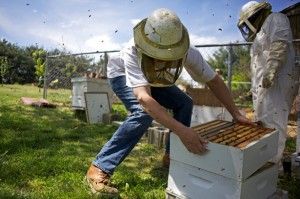Illinois’ keepers help repopulate bees

April 23, 2013
It’s not uncommon for beekeepers to lose a third of their honeybees each spring, but they have reason to worry when more than half of the country’s honeybees die almost instantly.
Honeybees nationwide died en mass this spring with experts citing multiple reasons for sudden drop. The loss could impact the economic value of honey and honey-related products. While the cause of the sudden deaths is unclear, organizations across the country, including some in southern Illinois, are trying to repopulate the bees.
Advertisement
Terry Combs, a member of the Illinois Queen Initiative, said his group is trying to help the state’s honeybee population by providing queen bees for any Illinois beekeeper.
“We’re basically trying to produce and promote queens and bees that are raised here in Illinois for the beekeepers of Illinois,” he said.
Combs said his group wants to provide honeybees to allow the same breed of bees to adapt biologically to Illinois. He said introducing other honeybee types such as southern states’ Africanized honeybees, makes them harder to control and more prone to mate with wild bee species.
The honeybee loss is not something to be taken lightly, Combs said, because they are important to the pollination process of almost 80 percent of the country’s crops.
The Illinois Queen Initiative has partnered with local beekeepers in taking direct action in the southern Illinois area by getting people to start their own beehives.
Scott Martin, a beekeeper in southern Illinois, said he and other area beekeepers are offering classes to teach people how to raise honeybees on their own and to help repopulate the depleted numbers.
“This year, we turned to the Illinois Queen Bee Initiative … to try and hold a class where we try to increase the number of local bees, the number of queens that are reared from local stock instead of getting them from Texas, or Hawaii, or some of the other warmer states,” he said.
Advertisement*
Martin said there has been an increased interest in beekeeping over the past few years and it is gaining more individuals every year. He said he thinks people pick up beekeeping to help the bee population in some small way.
Though efforts to bring the bees back are under way, their loss might have an impact on daily lives.
Sedonia Sipes, an associate professor in plant biology, said the honeybees are important to some aspects of the environment because they are a large contributor to the pollination process.
“Honeybees are our most important agricultural pollinator,” she said. “We’re overly dependent on them, but they’re not native to North America. So if we’re concerned about native vegetation, I don’t think that’s really dependent on honeybees but our crops, we’ve come to be dependent on honeybees.”
Sipes said while the large amounts of honeybee deaths will probably not impact the native vegetation, it will affect the country’s agriculture. She said the disappearance of so many honeybees is likely because of the combination of pesticide residues, viral diseases and parasites.
While honeybees have been hit the hardest this spring, Sipes said the concern is if native bee species will be affected by the same causes.
“The problems that are killing off honeybees, causing their decline, we’re not sure how they’re affecting other kinds of bees because no one’s keeping track of numbers for all these species the way honeybees are,” she said.
The loss of so many honeybees may also impact the economy of honey and honey-infused products, said Jessica Schindler, media relations director for the National Honey Board. The National Honey Board is a federal research and promotion board under the U.S. Department of Agriculture that conducts research, marketing and promotion programs to help markets for honey and honey products.
Honey can be used as a kitchen staple, an energy booster, a beauty aid and a cough suppressant, Schindler said. She said the average American consumes 1.3 pounds of honey annually.
Schindler said the loss of so many honeybees might impact the value of products that use honey just as much as honey itself.
“It certainly adds to the costs of the beekeepers having to rebuild their honey bee colonies,” she said.
Advertisement







